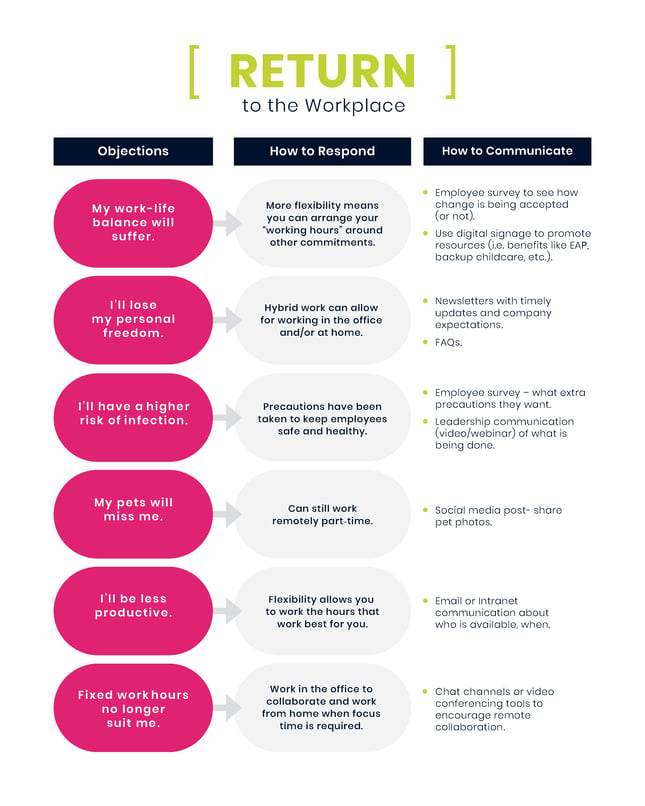
It’s been over a year since organizations around the world were met with a completely unprecedented “new normal", yet staying flexible is still at the top of most employers’ minds. As COVID-19 restrictions slowly lessen and the country starts to open back up for business, many workplaces will need to adapt their workplace to accommodate remote and in-office employees.
In a recent PwC survey of US executives, nearly one-third described their approach to post-pandemic work as "going with the flow." While being agile is an admirable employer quality, it’s still helpful to have plans and procedures in place and communicating with your employees what to expect.
Communicating Your Plan to Employees
Remind employees that their safety comes first. Adapting to any change post-COVID is difficult, and a return to “normal” isn’t realistic. Even if you don’t have all the answers it is imperative to keep your employees informed. Outlining your return to the office plans, even if they are tentative, helps your employees plan for changes to their adapted routines.
Here are some points to consider:
Check In
Surveys are an excellent tool to gauge employee’s feelings. This could be added to your Intranet, sent out via email or mailed to homes. Ask employees what they’re looking for with a return to the office, what their concerns are, etc.
-
- Employee readiness
Are your employees willing to return to the office? Do they have safety concerns? Are those concerns being addressed? These are some important questions that you need answers to before implementing any sort of back-to-work action plan. - Organizational readiness
Being ready to welcome employees back safely is key to opening your physical offices again. You will need to equip offices to ensure social distancing, proper sanitation, etc. so that your employees feel that you are considering their health and safety. - Address concerns
Understand your employee’s apprehensions, address them and include them in your action plans.
- Employee readiness
Maintain Engagement
Create activities or even use gamification to engage employees, encourage awareness and confidence that you have their health and safety in mind. Use key messaging with your communications.
Spread the Influence
Encourage and empower managers to be role models in their words and actions. Provide them with communication tools and resources to share so that you’re delivering a consistent message across all locations and help eliminate the burden on your managers. Seek champions or advocates: employees that can help motivate others. Now is the time to start building up the collaborative culture and spirit that may have been difficult to maintain virtually.
Adapt Your Messaging
Keep communicating. Create bite-sized reminders so as not to be overwhelming. Concise and actionable messaging is more likely to be read and remembered.
Open Channels of Communication
Be sure to check back in with managers and employees at large for feedback and continue to assess comfort levels with your plans.
How to Respond and Communicate to Objections
Here are some examples of objections and how to respond and communicate accordingly:

Above All Else: Keep Communicating
Communication has been the most crucial constant keeping the remote workplace connected. And that’s something that isn’t likely to lessen over time. Multi-channel communications are key for reaching each employee regardless of where they’re located. Whether it’s in-person, through email, text, intranet, social media or video conference, tailor your content to your employee audience and keep the lines of communication consistently open.


